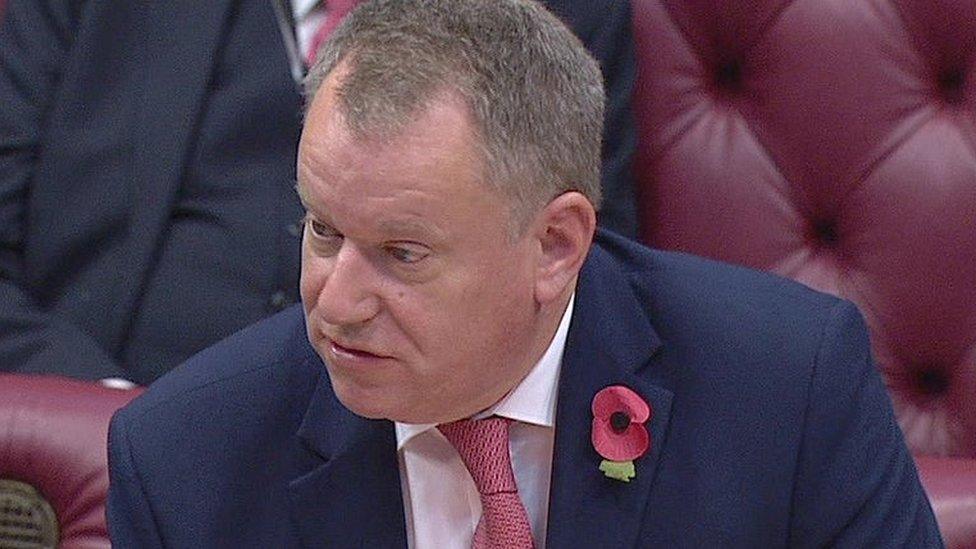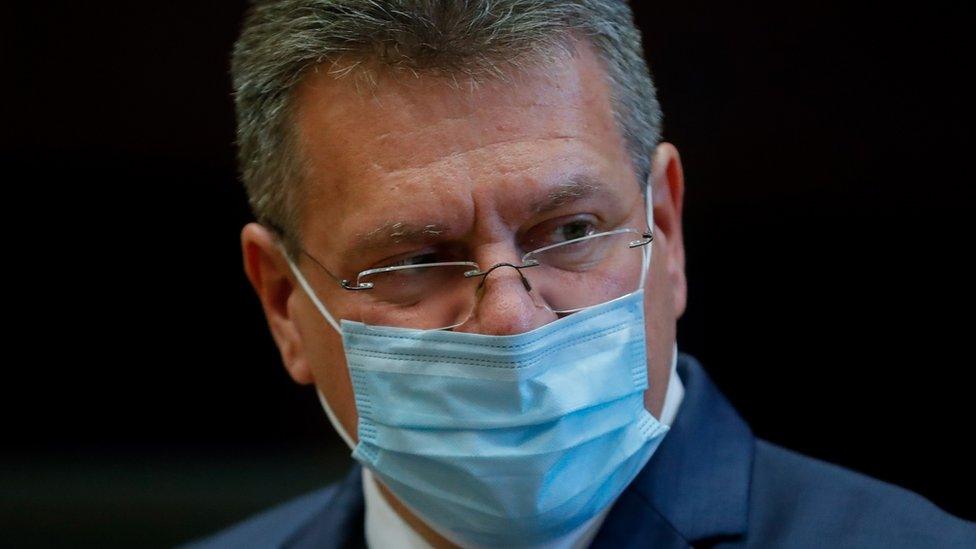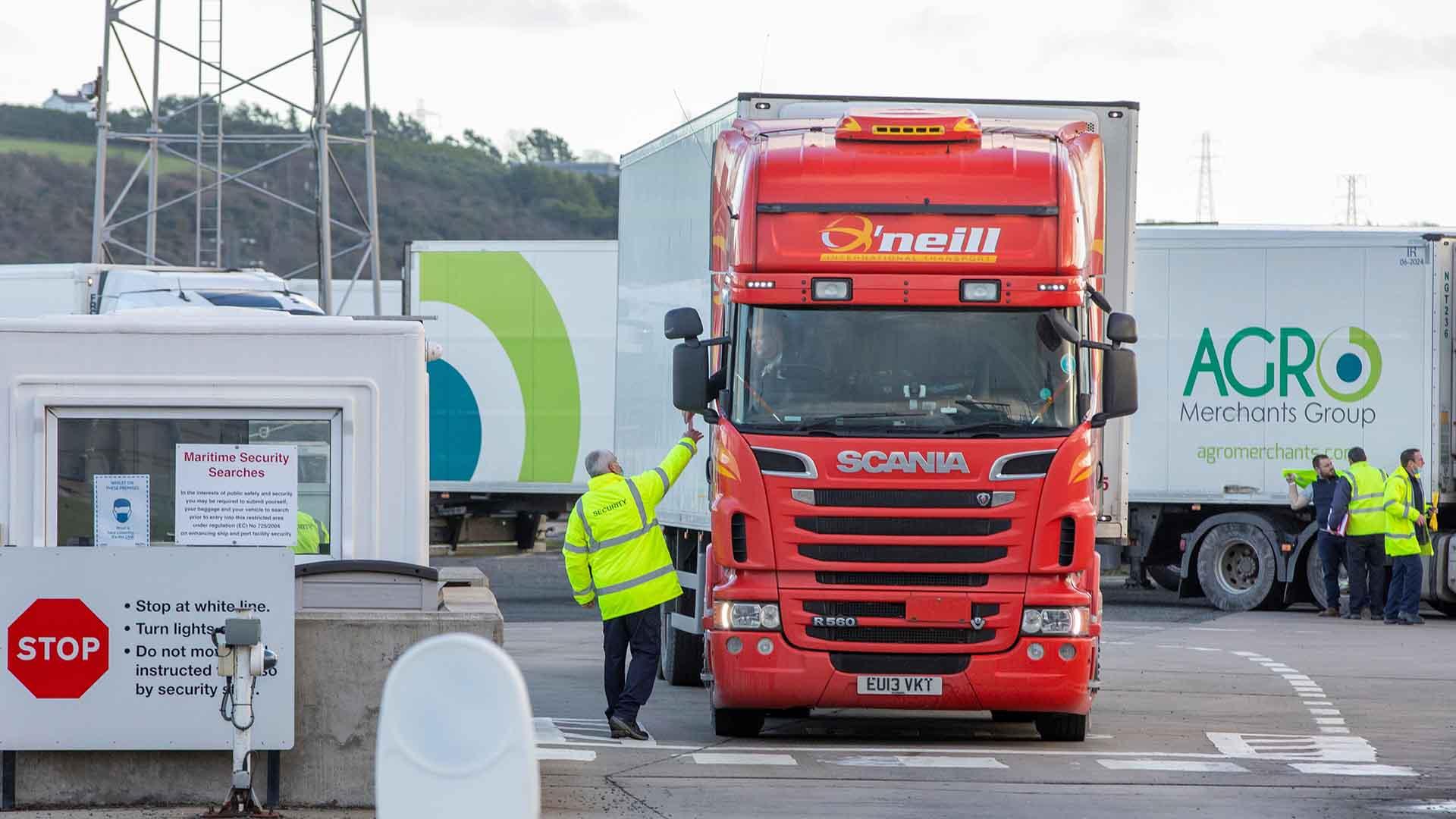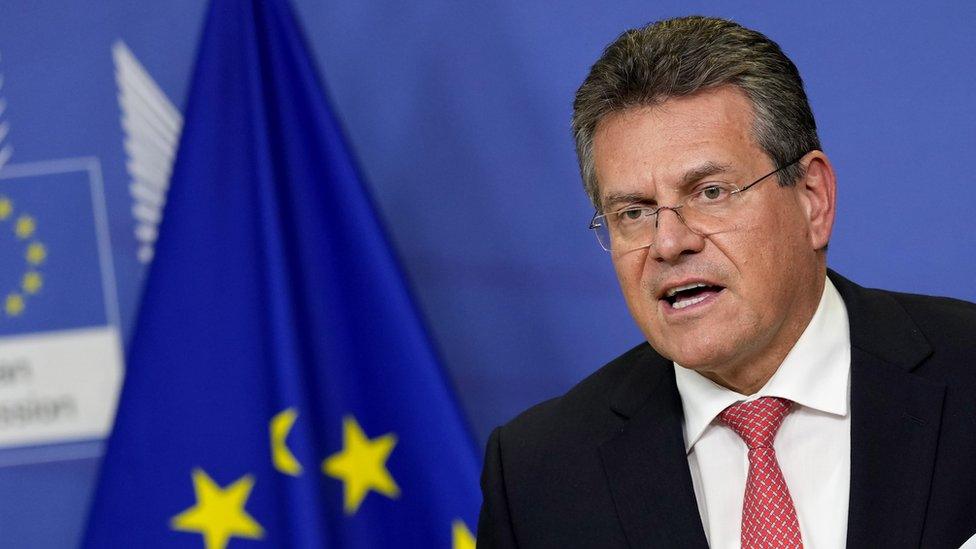Brexit: Suspension of NI-EU trade deal may be 'only option'
- Published

UK Brexit Minister Lord Frost said he would not give up until all negotiating possibilities had been exhausted
Suspending the Northern Ireland part of the Brexit deal will be the "only option" if UK-EU talks fail to resolve problems, Lord Frost has said.
The UK's Brexit minister gave an update after almost four weeks of intensive talks to address the standoff.
But he said the UK was "not giving up" yet and he wished to remain positive.
The EU has promised a "clear response" if the UK triggers Article 16 - a safeguarding mechanism within the Northern Ireland Protocol.
The protocol is a post-Brexit trading arrangement specific to Northern Ireland, but the UK wants changes to the deal it agreed with the EU in 2019.
The deal struck two years ago was aimed at preventing a hard border on the island of Ireland but critics argue it is disrupting trade and undermining Northern Ireland's position within the UK.
Article 16 of the Northern Ireland Protocol is a measure which allows either the UK or the EU to take unilateral action if they believe the arrangement is causing serious problems.
The UK has been warning since July that it believes the conditions have already been met to trigger Article 16 but is still trying to avoid that outcome through further talks.
There is growing speculation that the move could be just weeks away.
European Commission Vice President Maros Sefcovic has finished briefing EU ambassadors on the negotiations.
Suggestions out of the private meeting are that he did not bring much "good news", although hope remained for "productive" negotiations.

Maros Sefcovic has briefed EU ambassadors on negotiations
One diplomat told the BBC's Katya Adler the EU was "preparing for the triggering of Article 16 by the UK".
"There is consensus among EU member states that such an arbitrary and unjustified move by the UK will be met with a clear European response," they said.
Another diplomat suggested Britain's demands on the protocol remained unrealistic.
"The UK wants to eliminate checks altogether and have a system where only goods going through to Ireland are checked, though UK has no idea how we should do that."
'Stay calm'
Speaking in the House of Lords on Wednesday, Lord Frost said: "If the talks do in the end fail, we will of course publish in full our assessment of the EU's proposals and set out why they fall short of a durable settlement, but we will not do so until we have exhausted all the negotiating possibilities."

What would triggering Article 16 mean?

There is growing speculation that the UK is planning to use Article 16 of the Northern Ireland Protocol in the coming weeks.
The Irish government says such a move would be "reckless and irresponsible", and Maros Sefcovic has warned it could result in "serious consequences".
Ultimately, the EU could impose tariffs on UK goods - but that would only be possible after a lengthy arbitration process.
The arbitrators would first have to find that the UK is in breach of the protocol.
Then the UK would have to refuse to remedy that breach, at which point the EU could retaliate under the terms of the wider Brexit deal, the TCA.
It could require another arbitration process to rule whether the use of tariffs is proportionate retaliation.
There is a potentially faster legal track - known as infringement proceedings - which could lead to the UK being fined.

The minister argued that triggering Article 16 would be "wholly consistent" with the UK's legal obligations even though the EU disputes that position.
However, Lord Frost urged the EU to "stay calm" and "turn away from confrontation" over the protocol.
"If the EU were to choose to react in a disproportionate way, and decide to aggravate the problems in Northern Ireland rather than reduce them, that is of course a matter for them," he said.
"But at that point we would be entitled to come to our own judgement about how much value we could attach to their commitment to supporting the peace process and the people of Northern Ireland as against protecting their own interests."
Lord Frost will meet his EU counterpart Maros Sefcovic on Friday for a fourth round of discussions.
'Key influencer'
Democratic Unionist Party leader Sir Jeffrey Donaldson said he had a "useful discussion" with Taoiseach (Irish prime minister) Mícheál Martin.
"Dublin is a key influencer in Brussels. They must use that influence to reach a sensible outcome which is sustainable and can command the support of unionists in Northern Ireland," he said.


Speaking to the in the Dáil (lower house of parliament) on Wednesday, Mr Martin called on the UK government to "double down on dialogue" over the Northern Ireland Protocol.
"Discussions are still ongoing," he said. "I would just sound a note of caution that we don't automatically assume that anything is going to be triggered.
"We don't want a kind of a self-fulfilling prophecy either."
He also warned that the move would impact Northern Ireland's dual access to European and UK markets provided under the protocol.
Tanaiste (Irish deputy prime minister) Leo Varadkar said suspending the protocol would be a "big mistake" and urged UK Prime Minister Boris Johnson not to do so.
"It's a mistake to think that, by escalating tensions, by withdrawing from any part of it or trying to withdraw from any part of it, that you'll end up with a better deal," he said.
"You won't."
Alliance MP Stephen Farry said triggering Article 16 had become a "Sword of Damocles" over negotiations.
"Its [Article 16] use will do nothing to address the issues around the protocol, and will only bring greater instability and uncertainty for Northern Ireland, while sparking wider confrontation with the EU that would only damage the overall UK economy," he said.
In the US, several senior members of the House Foreign Affairs Committee published a joint statement, external criticising the UK's position on the protocol standoff as "dangerous".
"The Good Friday Agreement and broader peace process took patience and time to build, with good faith contributions from the communities in Northern Ireland, the United States, the United Kingdom, Ireland, and others," they said.
"In threatening to invoke Article 16 of the Northern Ireland Protocol, the United Kingdom threatens to not only destabilize trade relations, but also that hard earned peace.
"We call on the UK to abandon this dangerous path, and to commit to implementing the Northern Ireland Protocol in full."
Related topics
- Published17 May 2022

- Published2 February 2024

- Published5 November 2021
